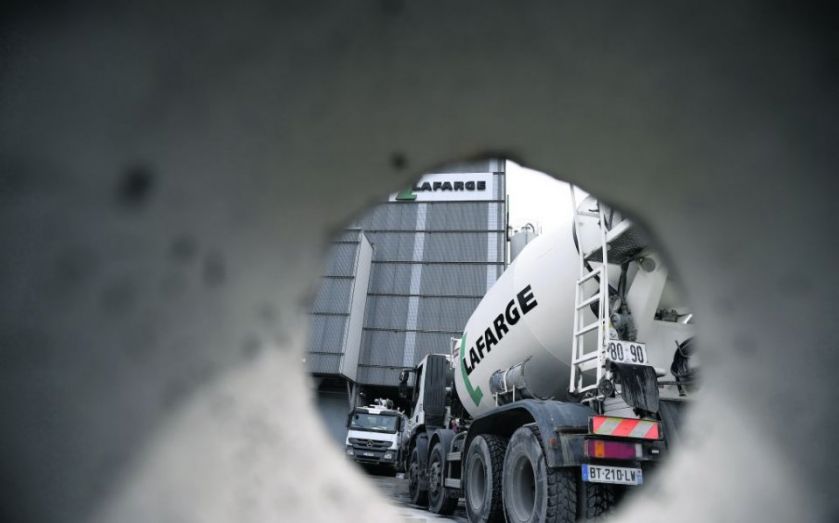CRH share prices rises as Irish aggregates firm nets Holcim Lafarge assets

Irish building materials group CRH’s deal to buy the assets being offloaded by cement firms Holcim and Lafarge ahead of their planned merger was “too good to turn down”, the company’s chief executive Albert Manifold said yesterday.
CRH announced on Sunday that it had entered into a binding commitment with Holcim and Lafarge to acquire assets across four regions, North America, Western Europe, Central & Eastern Europe and the emerging markets, for a cash consideration of €6.5bn (£4.9bn).
The assets being acquired include all of Lafarge’s UK operations – following Lafarge’s purchase of the remaining 50 per cent of its joint venture with miner Anglo American, Lafarge Tarmac – except for the Cauldon cement plant. CRH has engaged in negotiations with private equity house KKR over a potential sale of Lafarge Tarmac.
CRH will be taking on 15,000 employees across 685 sites in 11 countries. The acquisition also sees the Irish company take on 24 cement plans with a capacity of 23 tonnes per year, which will double the firm’s cement capacity.

The transaction will be funded partly through a 9.99 per cent £1bn equity placing, new debt and €2bn cash on the balance sheet. According to Manifold, with interest rates “at an all time low”, the time was right to make the purchase. The deal is expected to complete in mid-2015.
Manifold stated that the new regional activities CRH will enter as a result of the deal “actually fit extremely well with the existing business”.
He added: “It gives us the opportunity to get involved with the Asian market that we have been chasing for a long time.”
According to CRH, the deal makes it the third largest building materials company in the world and the second largest in terms of aggregates production. Analysts at Cantor Fitzgerald said that while the purchase “is not the most straightforward of deals, we believe significant demand exists for the materials assets globally”. The broker added: “CRH has a history of acquisition and successfully integrating businesses into its operations.”
Shares in CRH closed up by 7.17 per cent yesterday.
TIMELINE: CRH VS HOLCIM AND LAFARGE
1970
CRH is formed through a merger of two leading Irish public companies, Cement Limited and Roadstone, to become the sole producer of cement and the principal producer of aggregates, concrete products and asphalt in Ireland.
APRIL 2014
French cement company Lafarge and its Swiss counterpart Holcim announce plans for a share-for-share deal. The mega-merger could create a company with a combined market value of $50bn, but is also likely to face issues around competition.
APRIL 2014
The EU’s boss of antitrust Joaquin Almunia announces that the proposed merger will be subject to intensive review. It requires regulatory approval in 15 countries before being given the go-ahead. At this point, investment bank UBS had already warned that the merger could take up to two years to complete due to investigations that will arise from local competition authorities.
JULY 2014
Lafarge and Holcim unveil the list of proposed disposals, including almost all of Holcim’s assets in France and Lafarge’s in Germany.
NOVEMBER 2014
German firm Heidelberg Cement withdraws from the race to buy the assets after a “thorough analysis”.
JANUARY 2015
CRH confirms it has made a bid for the Holcim and Lafarge assets, although a rival offer from a consortium comprising of investment firm Blackstone, private equity house Cinven and Canadian pension fund CPP also emerges.
JANUARY 2015
CRH wins the race to buy the assets.
BEHIND THE DEAL
PETER LUCK | BANK OF AMERICA MERRILL LYNCH
1 Luck is a managing director of corporate broking at Bank of America Merrill Lynch (BAML). He was previously a corporate broker at UBS, and has also served as a captain in the Royal Dragoon Guards.
2 On this deal he was joined by his BAML colleague Jean-Eudes Renier, co-head of international global industrials group. Renier was previously managing director in the basic materials group at Morgan Stanley.
3 Meanwhile, the team of advisers from UBS included Hew Glyn Davies, James Robertson, Alexandre Blanchard, Anna Richardson Brown and Christopher Smith. JP Morgan and Davy also advised on the deal.